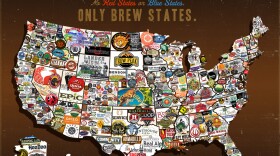In a marketplace crowded with amber ales, lambics, sours, and trippels, hard cider is a drink largely overlooked.
Steeped in over of American history, Colorado cider makers want to build on tradition, the growing craft beer market, and also on Colorado orchards.
“If you really look at our history and our heritage, our forefathers drank cider,” said Jennifer Seiwald, owner of in Fort Collins. “I think it was John Adams that drank a glass of cider with breakfast every single day.”
“So we have a huge and long tradition of cider. We just kind of forgot about it after we went through prohibition,” said Seiwald.

Hard cider is made by fermenting the sugar in apple juice into alcohol. Beer is brewed through the fermentation of malted barley, with its flavor coming mostly from hops.
“I come from the micro-brewing world and it’s a very different process,” says Brad Page, owner of the in Denver.
“Because we’re very tied into the fruit market, it’s a longer process. And in the beer world, the main ingredient is water, and malt is dry and you can store it. So it’s just a different production process. We’re much more dependent on the cycle of fruit.”
The Colorado Cider Company will produce around 25,000 gallons of cider this year. That takes a lot of apples -around 25,000 pounds per monthly batch. For Page, that works out to roughly 11 pounds of apples in every gallon of his cider.
The best apples for making hard cider, Page says, aren’t the type you normally buy at the store. They're not a Red Delicious or Fuji variety. What he and other craft cider makers need are bitter tasting apples that ferment well and make a thicker cider.
They need apples like , , or among others.
The trouble?
There aren’t a lot of Colorado orchards producing the type of apples needed by cider makers. They're also not producing the volume required for the ever expanding market. That could force the young industry to grind to a halt, before it even gets off the ground.
"As this fruit gets more cultivated, which obviously takes a long time, I think it'll develop just as the beer market developed."
Dick Dunn, President of the says his trade organization is striving to convince more orchards to produce the right kind of apples. Not just because it helps Colorado’s cider makers, it also helps the orchards themselves.
“A lot of existing orchards are getting killed by imports and by apples coming in from areas where it’s easier to grow,” said Dunn. “If we can convince people who have existing orchards that there’s a real market for cider fruit and that it’s not going to go away, then they’ll start working their trees over to the varieties we need.”

That’s a good thing for Brad Page of the Colorado Cider Company. He’s starting his own orchard on the western slope in hopes he can continue to make craft cider with Colorado apples and build the burgeoning industry. “As this fruit gets more cultivated, which obviously takes a long time, I think it’ll develop just as the beer market developed,” said Page.
Scumpy’s Hard Cider Bar in Fort Collins is barely two weeks old. But patron Sean Howell says he's finally found a place to indulge in his love of hard cider.
“I’m a big fan of cider. I drink cider all the time. So when I heard there was a cider bar opening, I got pretty excited about that,” said Howell. “I’m probably going to be spending a lot –probably too much time here. You know, probably half of my paycheck is gonna be going to Jennifer here.”
That’s exactly what Jennifer Siewald, and the rest of Colorado’s hard cider industry are banking their future on.
--
You can learn more about Colorado's craft beer industry in our series .














